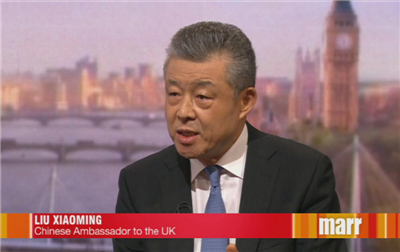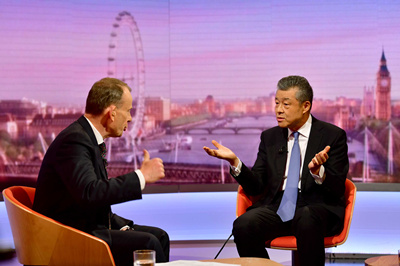|

On 7 July 2019, H.E. Ambassador Liu Xiaoming gave an exclusive live interview on BBC ONE's Andrew Marr Show about issues of Hong Kong, Huawei and Xinjiang. The full text is as follows:
Marr: Now, most diplomatic arguments are restrained muttering affairs, not so the row going on between Britain and China over protests in Hong Kong about a new extradition bill which many people there fear will shred their human rights. Jeremy Hunt, the Foreign Secretary, sympathized with the protesters. The Chinese Ambassador then held a rather rare press conference in which he angrily condemned the UK government for interfering in their internal affairs. He is with me now for his first interview since then. Welcome, Mr. Ambassador. You were quite angry, weren't you?
Ambassador: Yes, very much so. We are strongly opposed to British intervention in Hong Kong's internal affairs. We believe that this amendment of ordinance has a good reason because the Chief Executive and Hong Kong SAR government want to make Hong Kong a better and safer place, rather than a safe haven for fugitive criminals. But yet, the British government, senior officials, seemed to voice support for the demonstrators. What makes it even worse is that when the violence happened, they even voiced support. Instead of condemning the storming of the Legislative Council, they criticized the Hong Kong SAR government for the handling of the situation.
Marr: Jeremy Hunt just said that his heart went out to the protesters and he didn't approve of the violence. A lot of people thought there was a 50 year guarantee that not much would change in Hong Kong when handover happened, and that this is being eroded by this new law, because once you can extradite somebody very easily from Hong Kong to the mainland, then lots of people would stop saying what they would have said and free speech would be slowly silenced. And people do feel this is the beginning of the end of "One Country, Two Systems" agreement.
Ambassador: Andrew, that shows your lack of understanding of what this bill is about. It is not about extraditing people from Hong Kong to the mainland. Hong Kong has mutual assistance agreements with 30 countries, yet they do not have this similar agreement with more than 170 countries and regions. So that means if some people committed a crime outside Hong Kong and returned to Hong Kong, Hong Kong cannot punish them. This bill will plug the loopholes. I think some people are trying to use it to scare fear among Hong Kong people.
Marr: These are powers that Beijing wants?
Ambassador: I don't think so. The whole thing was started by Hong Kong SAR government. Just as the Chief Executive said, she received no instruction from Beijing. She received no order from Beijing. It is completely the initiative launched by Hong Kong SAR government, to make Hong Kong system more perfect, to improve the legal system.
Marr: We've seen all the scenes in LegCo in Hong Kong recently. There seemed to be the case that the police there couldn't hold back the protesters. If you feel the situation is getting out of control and the Hong Kong authorities can't control things, does China interfere directly in Hong Kong?
Ambassador: You mentioned "One China, Two Systems" for 50 years. We are fully committed to this promise. There is no question about that. So you can see that from day one till now, the central government has not interfered at all. Every step of the way, we let the Hong Kong SAR government handle this. Instead, it is the British government that was trying to interfere, voicing support for the demonstrators. When the rioters stormed the Legislative Council, they even said that you can't use this violence as a pretext for repression. So they tried to obstruct the legal process. To answer your question in a simple way, we have full confidence in Hong Kong SAR government. And it shows that they are capable of handling the situation.
Marr: Nevertheless, this law would make it easier to extradite people to China. Chris Patten, the last governor, said, things have gone from bad to very bad to even worse. People with the wrong views have been banned from political activity. Freedom of speech has been whittled away in the media and in the universities. Beijing has even abducted individuals from Hong Kong and taken them back to the mainland.
Ambassador: I totally reject the accusation of Chris Patten. As the last governor of Hong Kong, his body is in the 21st century, but his head remains in the old colonial days. This bill won't make it easier for Hong Kong to extradite people to the mainland. There are many safeguards. You know, first of all, there are 37 clauses as safeguards in this Bill. That means, no people would be extradited to mainland because of their religious or political beliefs. And the crime has to be punishable in both places. That means, to make an extreme case, if murder was not regarded as a crime in Hong Kong, then people who committed murder would not be extradited to the mainland.
Marr: There has been a very, very angry row by diplomatic standards. Jeremy Hunt is still threatening further, possibly, sanctions and so forth against China if it goes on. Is this a moment when British-Chinese relations are in real crisis?
Ambassador: I don't think so. We are not interested in diplomatic row with the UK. We are still committed to building stronger relationship, partnership. The "Golden Era" started by President Xi -- I still remember the last time you interviewed me was before President Xi's visit in 2015 --
Marr: I remember that.
Ambassador: we are still committed to this "Golden Era" between our two countries. But I cannot agree with some British politicians' description of the relationship. They even use this so-called "strategic ambiguity". I think this language does not belong to the vocabulary between China and the UK. It is a Cold War language.

(Source of this picture: BBC)
Marr: Another big row between Britain and China potentially is over the role of Huawei in the 5G electronic communications network. Can I put it to you that there is no way at all that the People's Republic of China would allow Western or British or American companies direct access to your security infrastructure?
Ambassador: You know, China is developing. To answer your question directly, I don't think Huawei would have access to your security infrastructure.
Marr: But it will be able to eavesdrop on lots of aspects of British life. And the law currently says it is obliged to hand over information the Chinese government wants and that's what scares people.
Ambassador: No. It will not happen at all. First of all, there is no back door, and also there are a lot of safeguards.
Marr: Can you promise people on this programme that if Huawei has complete access to our 5G network, information will not be passed back to the government in Beijing by Huawei?
Ambassador: I can promise that, a hundred percent. I think Huawei is a good company. It is the leader of 5G. I think if you reject Huawei, you will miss enormous opportunities. They are here for win-win cooperation. They are not here to spy on people.
Marr: All right. Let's turn to another big element of difficulties between the two countries, which is the treatment of the Uyghur people in northwest China. Now, there are camps all across that part of China. Up to a million people, according to the United Nations, have been interned in these camps, and BBC has reported on the separation of children from their families, going into camps for children. What is going on?
Ambassador: I think they have made a distorted picture of what is going on in Xinjiang. Xinjiang is a relatively poor area in China. In terms of GDP, it ranks about 26th in the whole country. There are more than 30 provinces. In the past, since 1990s, Xinjiang has been severely hit by terrorism, separatism and extremism. Just ten years and two days ago, on the 5th of July, there was a very serious terrorist incident. 197 people got killed.
Marr: Can I just put it to you that internment camps are not the answer? We tried them in Northern Ireland and it did not go well for Britain in Northern Ireland. These are camps with razor wire around them, people cannot leave them.
Ambassador: This is not a camp. It is a vocational education and training centre. You know that extremist ideas have easy penetration to the poorer areas. The idea is to help the people, to lift them out of poverty.
Marr: If these camps are only about that, if they are so innocent, why did the Chinese government deny for so long that they existed?
Ambassador: We didn't deny. We invited journalists and diplomats to visit. That is why BBC has access to interview people over there. I think you need to look at this from the positive perspective. It is for the purpose of early prevention of terrorism. And since the measure was introduced, there has been no terrorist incident for three years.
Marr: Nonetheless, these are quite difficult areas, these camps. They are internment camps and people cannot leave them, can they?
Ambassador: They can go, of course. They can leave freely. They can visit their relatives. It is not a prison. It is not a camp.
Marr: The BBC talked to some of the parents of Uyghur children who are now in Turkey and they are really upset about the fact that they have been separated from their children and they don't know where they are. I can show you a little clip of it so we can hear what they say. So where are these children?
Ambassador: Let's first talk about these people. They are anti-government people. You cannot expect a good word about the Chinese government. The children, you know, the government takes good care of the children.
Marr: Are they separating forcibly parents from their children in Xinjiang?
Ambassador: No. If they want to visit their children, they can come back to China.
Marr: So these are all just lies?
Ambassador: Definitely. There is no forcible separation of children from their parents at all.
Marr: The BBC has been to one town in the province where, in just one town, 400 families lost their children.
Ambassador: You just give me the names of the families who have lost their children. There is a lot of misinformation about people gone missing. We handled many cases like this. Some country said a musician got killed and the other day he emerged alive and happy. If you have people whose children are lost, you give me the names and we will try to locate them and let you know who they are and what they are doing.
Marr: Mr. Ambassador, thank you very much indeed for talking to us.
|

